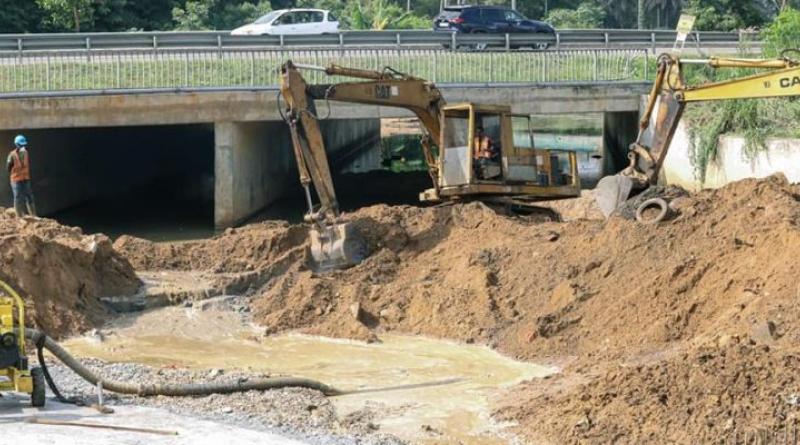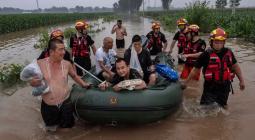Flood risks: what response within UEMOA?

Floods are common during the rainy season in Benin, Burkina Faso, Mali, Niger, Senegal, Togo, Guinea-Bissau and Ivory Coast. The attractiveness of cities as well as the livelihoods of their populations are taking a hit. Faced with these extreme weather phenomena which bring up to date the poor preparation of civil protection services and the inadequate adaptation of public policies to the urban occupation of risk areas, the West African Development Bank (BOAD) has been involved since over the past fifty years already in the financing of infrastructure, particularly flood management. Objective, limit the economic and environmental damage caused by natural disasters exacerbated by climate change.
[PARTNER ARTICLE] Abidjan and Yamoussoukro in Ivory Coast, Lomé in Togo, Bafatá in Guinea-Bissau. These main cities in West Africa, most of them coastal and port cities, are not spared from flooding. Every year, populations are forced to move when they are not themselves the victims of these cyclical phenomena which endanger biodiversity and therefore their means of subsistence. In August 2022, for example, many schools and homes in Saint-Louis in Senegal were submerged by water, particularly in the Pikine Guinaw Ray, Sor Diagne, Tableau Walo, Diaminar, Darou, and Médina Courses districts.
An economic disaster
A situation which worries the World Food Program (WFP) especially as the phenomenon decimates the resources of populations who mainly depend on agriculture. According to the UN agency, 43 million people in sub-Saharan Africa, the majority of whom are in West African countries, are exposed to food insecurity due to floods.
In Benin, torrential rains have caused spectacular flooding in recent years in 55 of the country's 77 communes , causing the death of 46 people and in the process , "680,000 tonnes of agricultural products and 201,600 hectares of crops were destroyed as well." that 81,000 head of livestock lost without forgetting the destruction of 455 schools and 92 health centers ,” regrets Komitse Edoh Agbo, Civil Engineer at the West African Development Bank (BOAD).
The infrastructure response
Faced with this phenomenon due in part to the geographical position of certain towns in the region in relation to sea level and whose management remains limited by the insufficiency and obsolescence of existing sanitation networks, the sub-regional institution , which operates in Benin, Burkina Faso, Ivory Coast, Guinea-Bissau, Mali, Niger, Senegal and Togo has activated its DJOLIBA 2021-2025 Strategic Plan focused in particular on climate resilience. Thus, BOAD finances, for example, the construction and rehabilitation of rainwater drainage infrastructure, particularly as part of the project to strengthen the rainwater sanitation network in Ouagadougou in Burkina Faso. “Our intervention focuses on the recalibration and development of the Kadiogo backwater which is the main watercourse of the urban watershed of the Burkinabe capital. These developments will later lead to the construction of a fourth rainwater retention dam in this city ,” explains Komitse Edoh Agbo.
Among the projects financed by the Bank, also include the development and integrated management of the Guru watershed in Abidjan in Ivory Coast. The work will limit the economic and ecological impact of flooding in the municipalities of Abobo, Adjamé, Cocody and Plateau. Concerning the city of Lomé in Togo, “interventions have taken place in the past for the development of the lagoon zone and the restoration of the rainwater retention capacity of the Bè lagoon” , explains the Doctor in Engineering Sciences which reassures that the construction of other sanitation works such as collectors is underway in Kaolack and Diamniadio in Senegal, and even in Bissau in Guinea-Bissau.
While it is clear that its allocations are distributed equitably among WAEMU member countries, the financial institution also takes into account funding priorities and emergencies. This is where the Rainwater Sanitation Program for Secondary Cities (PAPVS) in Benin finds its meaning. This program, worth 280 billion CFA francs, mobilizes several donors, notably BOAD which has already provided financing of 20 billion CFA francs for the drainage of rainwater in the town of Parakou and which is in in the process of examining the financing of works for the town of Natitingou. The other cities (Abomey, Bohicon, Calavi, Ouidah, Sèmè-Kpodji and Porto-Novo) are financed by the African Development Bank (ADB) and the European Investment Bank (EIB). Ultimately, theBeninese PAPVS managed by the Company of Road Infrastructure and Territorial Development (SIRAT) should enable the improvement of the living conditions of many city dwellers.
A future resilient to climate change in urban areas
In any case, this is what Komitse Edoh Agbo wants with the BOAD teams.“Retrospective evaluations of the Bank’s interventions provide encouraging feedback from the populations targeted by the facilities. For example, for the city of Ouagadougou, particularly in the Kadiogo marigot area, we have received several positive testimonies regarding the improvements brought by sanitation projects, but also urban roads. Note that all road asphalting works financed by BOAD are systematically coupled with rainwater sanitation for good drainage of rainwater in order to guarantee the durability of the road and prevent or eradicate flooding. Many neighborhoods, which were abandoned each rainy season due to flooding, are once again habitable and accessible .
In addition to financing infrastructure, the time has also come to strengthen the capacities of local stakeholders, particularly municipalities. In this regard, the technical and financial support of BOAD aims to “ensure that the works, once completed, can be properly maintained” , indicates the institution headed by Serge Ekué. As such, the main UEMOA cities have already benefited from awareness-raising actions on waste management as well as activities to strengthen the solid waste management sector.
“For example, in Ouagadougou, we are currently supporting the municipality with the acquisition of 1,000 trash cans, five garbage bins and two crushing bins. Added to this are training for municipal technical services staff on themes related to rainwater, as well as the provision of rolling and IT equipment. explains Komitse Edoh Agbo. According to him, this technical support from BOAD should promote the proper hydraulic functioning of pipes and other rainwater retention structures. This is the case with the Gourou basin in Abidjan where the launch of a pilot unit for training local stakeholders in the recovery of urban solid waste is already in sight .





